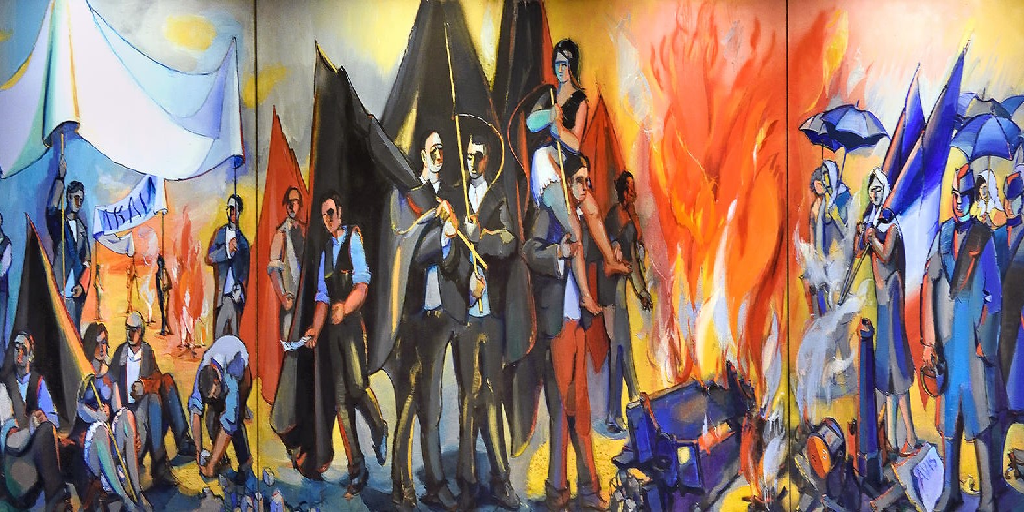France’s Psychodrama: Daniel Mahoney Responds to His Critics
I am grateful to David Walsh, Alan Charles Kors, and Theodore Dalrymple for thoughtfully engaging with my reflections on the 50th anniversary of France’s aborted revolution of May 1968.
Kors and Dalrymple add rich color and texture to my description of “the events,” driven as they were by boredom, sexual agitation, anti-bourgeois ire, and a deep romanticism about murderous revolutionaries in exotic foreign places (Cuba and China, in particular) about which most student revolutionaries knew little or nothing. Alan Charles Kors is of course right that the antinomian intellectual currents which made up the “thought of ’68” long predated the “events” themselves and had influence far beyond Parisian intellectuals circles. There was a recognizable New Left throughout the Western world and in important Third World circles, too. But only in France did a particularly virulent version of this ideology threaten to bring down a decent regime, that of General de Gaulle, and gave rise to adolescent dreams of political and social transformation that met and surpassed Edmund Burke’s famous description of ideological revolution as “metaphysical madness.”
Theodore Dalrymple could not be more right about the imaginative poverty of the revolutionary posters and slogans that are still celebrated by those nostalgic for their revolutionary youths. The culture had already been demeaned and impoverished for some years before 1968, as Dalrymple rightly stresses.
The “culture of repudiation,” in Roger Scruton’s memorable phrase, would survive May ’68 and would become the “effectual truth”—and lasting legacy—of those events. It would indeed achieve a posthumous victory in the cultural and moral realms. None of the commentators on my piece sufficiently appreciate the death blow that May ’68 struck at authoritative institutions in France and the Western world as a whole. The Foucauldian refusal to distinguish legitimate authority from raw power and domination is now a commonplace in grade schools and high schools throughout the Western world, not to mention in our elite institutions of higher learning.
Granted, there was political resistance to the French New Left and it was successful, at least in the immediate aftermath of May ’68. But even the “new philosophers” who broke with Soviet totalitarianism in the early 1970s under the impact of Aleksandr Solzhenitsyn’s magisterial anti-totalitarian epic The Gulag Archipelago (1974) could only speak the language of “human rights” and opposition to power and “domination” tout court. In a paradoxical way, they remained heirs of ’68, far from Solzhenitsyn’s own challenging recognition that the West was haunted by homegrown moral nihilism as much as by the totalitarian threat from the East.
Kors is right that there remain influential thinkers in France who reject the entire moral and cultural legacy of May ’68, Pierre Manent, Alain Besançon, and Marcel Gauchet, among them. They are among the best political thinkers in France. But they are fighting a rearguard—if honorable—action in a culture that has uncritically accepted many of the key presuppositions of the “thought of ’68.”
David Walsh rightly warns against a too facile dismissal of the student revolutionaries and their demands. But the transcendence he sees among the revolutionaries is really an inter-mundane messianism, respecting no moral limits and the very idea of a natural order of things. It has little or nothing in common with an authentic openness to the things of the spirit and an order of Being above the human will. It is a nihilistic, self-destructive, and soul-destroying messianism, an ersatz transcendence.
The student revolutionaries thoughtlessly rejected French civic values and dismissed, without an afterthought, the patrimony of Western civilization: in practice their demands for “liberation” gave rise to limitless hedonism and individualism, a new culture of the autonomous “self.” They were blind to how ideological revolution destroys both material prosperity and the spiritual discipline and aspirations that allow a liberal order to renew its moral foundations.
There is no doubt that free people can become excessively engrossed in the requirements of everyday life. We do not need high theory to recognize this threat to the integrity of liberal societies. But to disdain “métro, boulot, dodo”—subway, work, sleep—is to mock the everyday requirements of individual and collective life. It is to excessively spiritualize human life, as if human beings were angels without bodies. Facile anti-bourgeois ire, and an ignorant dismissal of the classical and Christian traditions which were the glory of the West, will not put us in touch with the authentic sources of spiritual and human transcendence.
Aron’s admirable efforts to cultivate political prudence, to defend age-old, choice-worthy authoritative institutions, and to balance liberty, moderation, and philosophical reflection on a life worthy of human beings, seems more elevated than the alternative models, however thrilling or inebriating they might be in the middle of revolutionary “events.” Let’s leave the revolutionary frisson to those who are content with repudiating reality.
I thank my commentators once again for rich and thought-provoking responses to my piece. We agree on much but I warn them that far from being a localized episode, May ’68 represents the self-immolation of a liberty that rejects the limits and cultural preconditions of a freedom worthy of human beings. Our enemy is no longer simply totalitarianism but a nihilism, sometimes soft and unacknowledged, but increasingly brutal and despotic, that separates liberty from truth, and liberty from civilized self-restraint. What Raymond Aron and Charles de Gaulle stood for in May 1968 was the defense of “liberty under law.” That is still our cause. It is never too prosaic or bourgeois to defend for those who care about the sustenance of liberty and human dignity in our late modern world.
